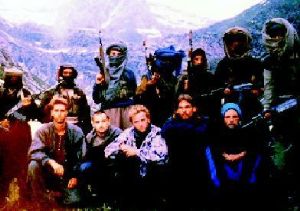
New Delhi, August 6: More than three months after the release of an explosive book on the 1995 abduction of six western backpackers by militants in Kashmir, neither the Army nor the Centre has responded to the authors' allegations that the government did not rescue the hostages despite having intelligence on the movement of the captors. TOI's attempts over a period of two weeks to get a reaction from the Army were met with silence.
The events date back to July 1995, when a terror outfit called al-Faran, an offshoot of the Harkat ul-Ansar, is believed to have abducted the tourists to negotiate the release of 21 comrades locked up in Indian prisons. These included Jaish-e-Muhammad ideologue Maulana Masood Azhar (who was released in 1999 in exchange for IC814 passengers) and British national Omar Sheikh (who would later kill journalist Daniel Pearl).
One of the abducted tourists, American John Childs, escaped; but four others — Keith Mangan (British), Paul Wells (British), Donald Hutchings (American) and Dirk Hasert (German) — vanished without a trace. A fifth, Hans Christian Ostro ( Norway), was found dead with his head 40 feet from the torso.
Now, 17 years later, those horrific events have been revisited in the book, The Meadow, written by British journalists Adrian Levy and Cathy Scott-Clark. It hit the stores in April this year.
The book does not just hint that the government wasn't keen on mounting a rescue, quoting crime branch sources, it claims it wasn't al-Faran but forces loyal to the government that had bumped off the tourists with the connivance of the special task force and the Army.
The then Narasimha Rao government, the book alleges, wanted to use the hostage crisis as a tool to build international pressure on Pakistan. It says the government had intelligence about the movement of the terrorists and the hostages, including high-resolution images taken by an armed forces helicopter.
'Raped for telling truth'
In another fantastic claim, the book says when a woman foreign tourist who had seen five hostages being taken away to Aru on July 5, 1995, reported the matter to the nearest Rashtriya Rifles (RR) camp, a major raped her.
It says the RR ran informer networks of surrendered militants (or renegades) and had put in place a cash-for-corpses incentive scheme. The renegades used to be paid between Rs 10,000 and Rs 20,000 per corpse depending on the seniority of the slain militant; but the RR never conducted any physical verification of the bodies, the book says.
In the face of such serious charges, TOI decided to elicit an Army reply. We tried to speak to Major General SL Narasimhan, additional director general public information (ADGPI), Indian Army. We called him up at his office at South Block in New Delhi on July 10 and asked for his reaction on the book. He expressed ignorance about the book and instead asked TOI for details.
After being briefly told about the book's contents, the Major General said, "Many people will say many things about a lot of issues. That doesn't mean any of it is true." He then promised to revert with a specific response after reading the book. We called Maj Gen Narasimhan again on July 12 but his PA said he was busy and asked us to call up after 5pm. When we did, we were told the general had left for the day. We asked for the general's email ID, which the PA said he didn't have.
Next, we tried to reach military secretary Lt Gen Syed Ata Hasnain, who was, until June, the general officer commanding of 15 Corps based in Srinagar. The RR — a crack counter-insurgency force — is under the operational command of 15 Corps. Gen Hasnain was unavailable on July 12 and the next day.
We then asked for Gen Hasnain's staff officer, Colonel Anupam Singh Randhawa. He was available. "I have read the book; but, I am afraid, I cannot say anything about it. You see, I can fix up an interview with Gen Hasnain only if the ADGPI permits. You will have to speak to him about it," Randhawa said. We turned to the ADGPI and again found him "busy".
Once again, we asked for his email ID; but this time, the PA asked us to speak to Colonel H Sawhney, director, media. He gave us an email ID and told us he would pass on the message to Gen Narasimhan. So, on Friday, July 13, we sent the email. The reply never came. We contacted the ADGPI again on July 25 to find out if he had read the book and was willing to comment. This time he was "busy having lunch".





Comments
Add new comment